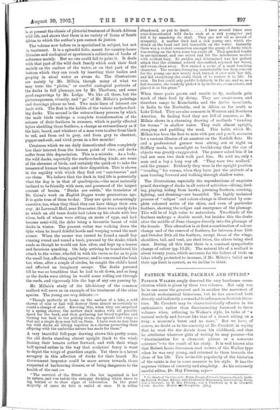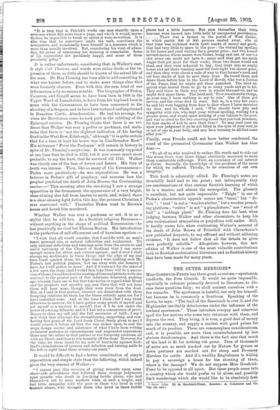PATRICK WALKER, PACKMAN AND STYLIST.*
PATRICK WALKER amply deserved the very handsome resus- citation which is given by these two volumes. Not only was he in one sense the greatest and in another the narrowest of Scottish ecclesiastical historians, but he has exercised both directly and indirectly a remarkable influence on Scottish litera- ture. Mr. Crockett may be characteristically effusive in his enthusiastic rather than discriminating foreword to these volumes when, referring to Walker's style, he talks of " a natural melody and fervour like that of a linnet sitting on a twig: a moment's burst and no more." But we have, of course, no doubt as to the sincerity of Mr. Crockett in saying that he read the Six Saints from his childhood, and that be attributes whatever gifts of writing he may possess—his " discrimination for a clean-cut phrase or a sonorous sentence "—to the result of his study. It is well known also that Robert Louis Stevenson read writers of the Walker type when he was very young, and returned to them towards the close of his life. This invincible popularity of the historian of the saints is due in some measure to his style. It has the supreme virtues of sincerity and simplicity. As his extremely careful editor, Dr. Hay Fleming, says-L..
• sa Sainte of the Covenant Peden, Temple,Welirood, Cameron, Cargill, Smith.
By Patrick Walker. Edited, with Illustrative Documents, Intraluction, Notes,
and a Glossary, by D. Bay Fleming; and a Foreword by S. Crockett. 2 vols. LUL,1011 Hodder sad Stoughton. [2.55.1
"It is true that in Patrick's works one may stumble upon a sentence which fills more than a page, and which it would, never- theless, be impossible to break up unless it were re-written. It is also true that he sometimes omits the verb, sometimes the nominative, and occasionally loses himself in a sentence which is more than usually involved. But, considering his want of educa- tion, his power of expressing his meaning is remarkable. Some of his expressions are peculiarly happy, and some of them peculiarly pithy."
It is rather unfortunate, considering that, in Walker's ease, le style c'est rhonme. and words were either deeds or the ex- pression of them, so little should be known of the actual life of the man. Dr. Hay Fleming has been able to add something to what was known before, and to make some things clear that were formerly obscure. Even with this, the sum total of our information is by no means notable. The biographer of Peden, Cameron, and Cargill seems to have been born in 1666 in the Upper Ward of Lanarkshire, to have from his boyhood been in arms with the Covenanters, to have been concerned in the shooting of a dragoon, and to have been tortured and imprisoned in Dunottar Castle, Aberdeenshire. He had his revenge, for when the Revolution came he took part in the rabbling of the Episcopal curates. Dr. Fleming thinks that there is no evi- dence that Walker was ever a pedlar or packman, and main- tains that there is "not the slightest indication of his having lived in the West Bow, Edinburgh," although " it is quite certain that for a time at least his house was in Candlemaker Row." His nickname " Peter the Packman" will remain in history in spite of Dr. Fleming's scepticism. It was commonly supposed at one time that he died in 1732, but it now seems much more probable, to say the least, that he survived till 1745. Walker was clearly one of the best of lovers and haters. His love of truth was intense. Then, like so many of the Covenanters— Peden more particularly—he was superstitious. He was a believer in Peden's gift of prophecy, and narrates how the prophet predicted the death of John Brown, the Covenanting carrier :—" This morning after the sun-rising I saw a strange apparition in the fermament, the appearance of a very bright, olear-shining star fall from heaven to earth, and, indeed, there is a clear-shining light fallen this day, the greatest Christian I ever conversed with." Thereafter Peden went to Brown's house and found him murdered.
Whether Walker was ever a packman or not, it is as a stylist that he will live. As a Scottish religious Rousseau— without anything in the shape of political Rousseauism—he has practically no rival but Thomas Boston. His introduction is the perfection of self-effacement and of harmless egotism :- " I wish that all would consider that I meddle with no man's heart, personal sins, or natural infirmities and weaknesses. 'Tis only national defections and turnings aside from the sworn-to and aeal'd testimony of the Church of Scotland that I can never enough mourn for, abhor, and witness against ; and if ever I shall change my sentiments in these things and the edge of my zeal turn blunt against them, 'tis high time I were tinkling over Mr. Peden's last publick prayers, Let me away with the honesty I have, for I will gather no more.' And if it were not for the sakes of a few upon the stage (and I would fain hope there will be a succes- sion of them) I would reckon it a wasting of time and pains to write one sentence to the greater part of this infatuate, demented, pushing age, wherein there are so few that take notice or regard what Moses and the prophets and apostles say, and these that will not hear them will hear none, though they were risen from the dead. But, as I said in that preface, whoever are dissatisfied with these foregoing relations let them lay the blame entirely upon me, for I have consulted none. And at the time I think (but I may think otherwise to-morrow, for I have gotten many proofs of myself and yet myself is a mystery to myself) that if I be not under the power of a strong delusion, and if I had not a concurrence of provi- dences to clear my call and the full assurance of faith ; I say I now think that (through the strengthening, supporting, and com- forting free grace of the Lord Jesus Christ freely given to me) I would esteem it before all that the sun shines upon, to seal the scope design matter and substance of what I have been writing (whatever mistakes in circumstances and unguarded expressions there may be) either in that preface or the foregoing relations, all with my blood ; and thus to win honestly off the stage. However, for the time, let them stand for my mite of testimony against Scot- land's abominations of tyranny and defection and turning aside to the left or right hand these seventy-six years."
It would be difficult to find a better combination of simple superstition and simple style than the following, which indeed gives the very essence of Walker :—
" I cannot pass this occasion of giving remarks upon some observable providences that followed these strange judgments upon persons who dwelt in low-lying fertile places, who laid themselves out to raise markets when at such a height, and had little sympathy with the poor or those who lived in cold Inuirish places, who thought those who lived in these fertile places had a little heaven. But soon thereafter their little heavens were turned into little hells by unexpected providences."
There was a farmer in the parish of Weat Calder, in which parish 300 of 900 persons wasted away, who at that time was reckoned worth 6,000 marks of money and goods, that had very little to spare to the poor ; the victual lay spoiling in his house and yard waiting for a greater price ; and two honest servant-lasses, whose names were Nisbet, being cast out of service (for every one could not have it ; many said they got too much wages that got meat for their work), these two lasses would not steal, and they were ashamed to beg ; they crept into an empty house and sat there wanting meat till their sight was almost gone; and then they went about a mile of way to that farmer's yard, and cut four stacks of kail to save their lives. He found them, and drave them before him to the Laird of Bawds, who was a Justice of the Peace, that he might get them punished. The laird en- quired what moved them to go by so many yards and go to his. They said these in their way were in straits themselves, and he might best spare them. The laird said, Poor conscionable things, go your way, I have nothing to say to you.' One of them got service, and the other died in want. But lo, in a very few years he and his were begging from door to door whom I have served at my door, and to whom I said, Who should have pity and sympathy with you, who kept your victual spoiling, waiting-fora greater price, and would spare nothing of your fulness to the poor, and was so cruel to the two starving lasses that you took prisoners, for four stacks of kail to save their lives ? Ye may read your sin upon your judgment if ye be not blind in the eyes of your soul, as ye are of one in your body, and may be a warning to all that come after you.'" Finally, even Fronde could not have better condensed the creed of the persecuted Covenanter than Walker has thus
done ;—
"To all of us who resolved to endure His wrath and to ride out this storm there were three things absolutely necessary to make them comfortable sufferings. First, an assurance of our interest in Christ. Secondly, the knowledge of the goodness of the cause for which we suffered. Thirdly, to be conscious of our own integrity."
This book is admirably edited. Dr. Fleming's notes are invariably lucid and to the point ; not infrequently they are condensations of that curious Scottish learning of which he is a master, and almost the monopolist. The glossary is excellent, but not quite impeccable. " Taigle " in one of Peden's characteristic appeals means not " tease," but " de- tain " ; " tent " is not a " wooden shelter," but a wooden preach- ing platform ; " culter" is not " a ploughshare," nor " stock of kail" a " cabbage plant." Dr. Fleming does his best, when judging between Walker and other chroniclers, to keep his own ecclesiastical sympathies or prejudices well under. Still, it hardly seems fair, when contrasting Walker's account of the death of John Brown of Priesthill with Claverhouse's now published despatch, to say offhand and without adducing evidence, "It does not follow that all the details he gives were perfectly reliable." Altogether, however, this new edition of Walker is one of the most valuable contributions both to Scottish ecclesiastical literature and to Scottish history that have been made for many years.







































 Previous page
Previous page